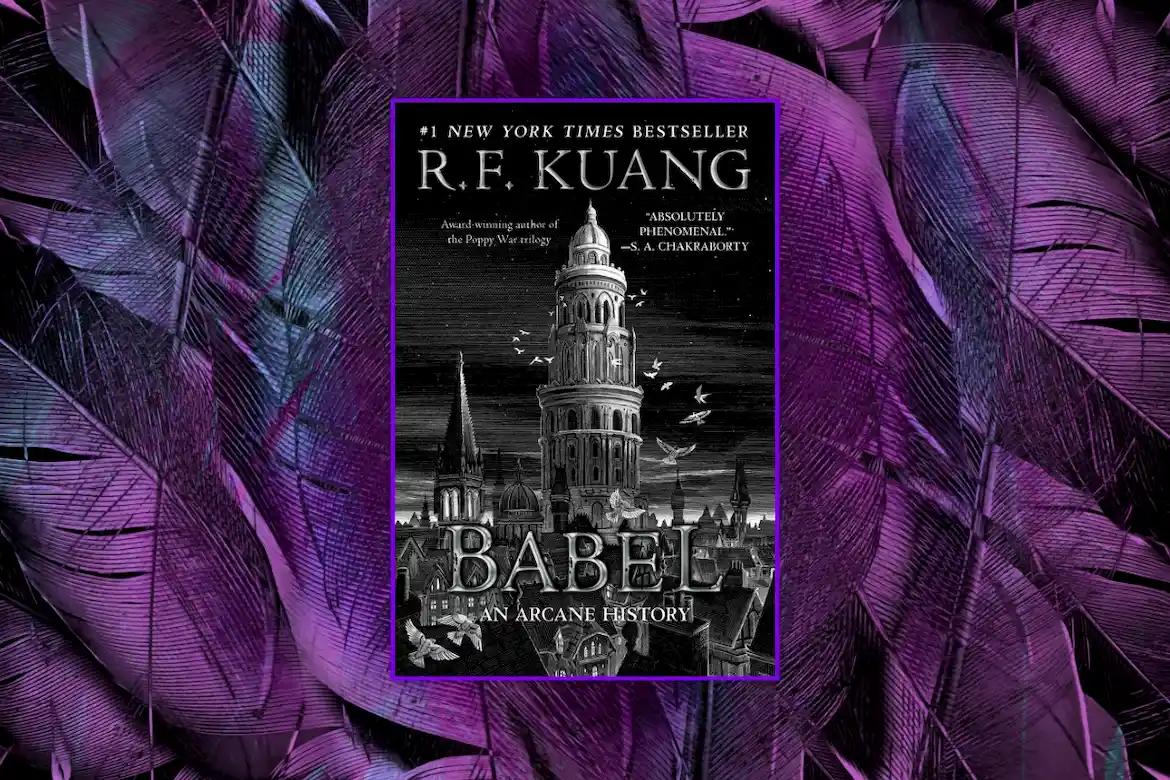You can find and buy the books we recommend on our LitStack Bookshop list of LitStack Recs.

In This LitStack Rec of Babel
Unveiling “Babel” | Journey into Language, Power, and Revolution
Babel is a Monumental Achievement
In the literary landscape of historical fantasies and critiques of empire, R.F. Kuang’s Babel: Or the Necessity of Violence: An Arcane History of the Oxford Translators’ Revolution demands not just to be read, but to be deeply considered. We love this book! I am on my second read.
It’s more than just a novel; it’s an emotionally immersive, thought-provoking journey into an alternate 1830s Oxford, where the pursuit of knowledge is inextricably linked to love and friendship as well as the brutal machinery of silver magic and global imperialism. For anyone seeking a narrative that masterfully blends intricate world-building, complex characters, emotional investment, and searing social commentary, with a realistic and ingenious magical lore, Babel is an indispensable read. It engages you on so many levels, emotional, intellectual, political, and personal. If this were the only book available today, you would have a great day!
A Boy Named Robin Swift
The narrative unfurls through the eyes of Robin Swift, a Chinese orphan brought to London by the enigmatic Professor Lovell. We never see Robin Swift’s true Chinese name written in the book, but we hear its whisper across these pages, as we are meant to hear. For underlying all of Robin’s actions is the blunt truth of the death of his mother at the beginning of the book. Robin’s journey after that, into Babel, the prestigious Royal Institute of Translation, initially promises a utopian pursuit of knowledge. The classmate friends he makes, and the closeness of these friends is palpable, it is so well portrayed and written. The scenes are crisp and the dialogue witty yet realistic, evoking layers of meaning.
Robin Swift and his close-knit group of fellow cohorts–students Ramy Mirza, Victoire Desgraves, and Letty Price, are a diverse group, representing different facets of the British Empire’s impact and influence. Their innocence and insularity of their academic lives eventually collide with the harsh power realities of their world. Kuang excels at showing, rather than telling, how the seemingly innocuous act of translation within Babel directly fuels the violent expansion of the British Empire, in the second half of the novel, showing the escalating Opium Wars with China.
The Magic of Misunderstanding
At its heart, Babel is a story of language, power, and the profound, often destructive, act of translation. Kuang constructs a fascinating magical system around silver-working, a process that harnesses the subtle nuances and lost in translation meanings between languages to imbue silver bars with magical power. This ingenuity is not benign; it is the very engine of British global dominance, allowing the Empire to extend its reach and exploit its colonies with unparalleled efficiency.
This unique magic system isn’t merely a fantastical element; it serves as a brilliant metaphor for the ways in which language itself can be a tool of control, a means of shaping narratives, and a vehicle for cultural subjugation. Kudos to Kuang for a brilliant bit of magic lore building. It is infinitely elegant and humanistic, the yearning to find the essence of the ineffable, magic hales from the meaning we cannot speak or communicate. Here a brief moment when Robin invokes magic:
Something pulsed in the silver–something alive, something forceful and bold; a gale of wind, a crashing wave; and in that fraction of a second Robin felt the source of its power, that sublime, unnamable place where meaning was created, that place which words approximated but could not, could never pin down; the place which could only be invoked, imperfectly, but even so would make its presence felt. A bright warm sphere of light shone out of the bar and grew until it enveloped them both. (234)


Colonialism and the Necessity of Violence
What makes Babel truly compelling is its unflinching exploration of its core themes. Colonialism and imperialism are not just backdrops; they are the very air the characters breathe. Babel meticulously deconstructs the mechanisms of empire, from the casual racism embedded in everyday interactions to the systemic exploitation of resources and peoples. Kuang doesn’t shy away from depicting the dehumanizing effects of colonialism, forcing readers to confront the often-ignored human cost of historical progress. This isn’t a romanticized view of empire; it’s a stark, uncomfortable, and necessary examination of its true nature.
The titular necessity of violence is perhaps the most provocative theme, and one that resonates deeply in our contemporary world. As Robin and his friends awaken to the brutal truth of Babel’s complicity in oppression, they are forced to confront the agonizing question: can a deeply entrenched, inherently violent system be dismantled through peaceful means, or does resistance, to be effective, demand reciprocal violence? This moral quandary is explored with nuance and gravitas, offering no easy answers but compelling readers to wrestle with the complexities of revolution and its ethical implications.
Identity, Belonging, and the Human Cost
Beyond the grand historical and political narratives, Babel is also a profoundly personal story. Robin’s struggle with his identity, torn between his Chinese heritage and his British upbringing, is a powerful exploration of belonging and alienation. The diverse experiences of Ramy, Victoire, and even Letty, highlight the multifaceted impacts of empire on individuals. Their friendships, betrayals, and evolving political consciousness form the emotional core of the novel, allowing readers to connect with the larger themes on a deeply human level.
A Literary Triumph: Prose, Research, and Lasting Impact
Kuang’s prose is both elegant and precise, allowing for a rich academic atmosphere to coexist with moments of gripping tension and profound emotional weight. Her meticulous research into the period enriches the world-building, making the alternate history feel incredibly real and lived-in. While the book is intellectually stimulating, it never sacrifices its narrative drive; it’s a page-turner that will keep you invested in the fate of its characters and the unfolding revolution.
For readers who appreciate dark academia but crave a more critical and politically charged lens, Babel is a revelation. It exposes the often-unacknowledged complicity of academic institutions in systems of power, challenging the notion of knowledge as inherently neutral.
In conclusion, Babel: Or the Necessity of Violence is a masterful work of historical fantasy that transcends genre. It is a vital and timely novel that forces us to confront uncomfortable truths about history, power, and the enduring legacies of colonialism. It’s a book that will linger in your thoughts, prompting reflection and enlightenment. If you are seeking a novel that is as intellectually stimulating as it is emotionally resonant, a story that blends magic with hard-hitting reality, then make Babel your next read. You won’t regret immersing yourself in this necessary and unforgettable novel.
~ J.S. Hood


About R.F. Kuang, Author of Babel

Rebecca F. Kuang, known professionally as R.F. Kuang, is a Chinese-American author celebrated for her distinctive blend of fantasy, historical fiction, and incisive social commentary. Born in Dallas, Texas, she spent her formative years in the United States before pursuing higher education that would profoundly influence her literary output. Kuang attended Georgetown University, where she earned a B.S. in International Relations. Her academic journey continued at the University of Cambridge and the University of Oxford, where she completed M.Phil. degrees in Modern Chinese Studies. Currently, she is pursuing a Ph.D. in East Asian Languages and Literatures at Yale University.
Kuang’s academic background in Chinese history, linguistics, and international relations is deeply interwoven with her fiction, providing a rich tapestry of historical detail, cultural nuance, and critical perspectives on colonialism, power, and language. Her debut novel, The Poppy War, published in 2018, launched a highly acclaimed epic fantasy trilogy inspired by 20th-century Chinese history, particularly the Second Sino-Japanese War. The series garnered widespread critical acclaim for its unflinching portrayal of war’s brutality, its complex characters, and its exploration of themes like imperialism, vengeance, and the moral ambiguities of power.
Beyond The Poppy War trilogy, Kuang has continued to explore similar themes and expand her literary repertoire. Her standalone novel, Babel, or The Necessity of Violence: An Arcane History of the Oxford Translators’ Revolution (2022), is a dark academia fantasy set in 1830s Oxford, focusing on translation, colonialism, and the revolutionary potential of language. This novel, too, has been lauded for its intricate world-building and its trenchant critique of imperialistic practices.
Kuang’s work is characterized by its intellectual rigor, its willingness to confront difficult historical truths, and its compelling narrative voice. She is a highly regarded voice in contemporary speculative fiction, pushing the boundaries of the genre by infusing it with deep historical research and pointed social commentary. Her writing often grapples with questions of identity, the weight of history, and the often-destructive forces of human ambition, establishing her as a significant and influential author in the literary landscape.


Titles by R.F. Kuang

Other LitStack Resources
Be sure and check out LitStack Spotlights that shine a light on books we think you should read.
As a Bookshop, Malaprop’s, BAM, Barnes & Noble, Audiobooks.com, Amazon, and Envato affiliate, LitStack may earn a commission at no cost to you when you purchase products through our affiliate links.




